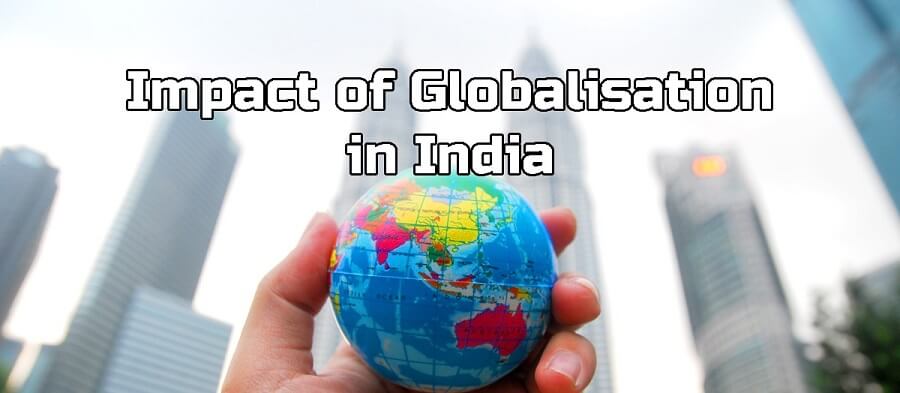Globalisation is the term which is commonly referred to as the exercise of interaction and incorporation among companies, people, governments across the globe.
With the advancement of technology, globalisation has been expanding since the 18th century. Expansion of communication, transportation, exports and imports to different countries has been witnessed in recent years.
The rise in global integration, exchange of trades and culture have contributed to the increase in globalisation.
Globalization economically involves the trading of goods, services, data, assets, technology and other work capital.
Technological advancement in transportation has removed a barrier which was observed earlier. Jet engines, ships, container ships etc. are used for the supply of goods from one country to another.
Growth in communication is also a major factor for the increase in globalisation. With the internet, mobile phones and other networking tools, it is easier for one to transmit and interact with different organizations.
There is no doubt that our country also has corporate globalisation. There is an evident impact of globalisation in India.
Where it is the economic impact or socio-cultural impact, globalisation has affected every sector of the country.
Globalisation is the reason due to which innovation and technology have been outspread across the globe. Many economists have stated globalisation as an astounding move towards liberalization.
Globalisation has vast influence and impacts over monetary and economy of the nation. As it involves a huge exchange of capital, goods and services, it highly affects the financial status.

Many factors have contributed to the expansion of globalisation. Some of which are listed below:
- Rapid transportation has made trading and travelling much faster and easier. Nowadays, goods and people can speedily travel anywhere in the world.
- Technology and automatization are the prime factors for global integrity. With the increase in communication and network, there is much more scope for job opportunities.
- Growth of the World Trade Centre has effectively decreased the barriers of trading and business. It has also improved the flow of capitals between different nations.
- Enlargement of multinational corporates which is MNCs have increased the scope of local and foreign interaction.
Impact of globalisation in India
India being one of the fastest developing countries, is perfect for developed countries to increase its trading and interaction.
As India is home to labour capital, raw materials and other capital, it is perfect for liberalisation. MNCs are looking forward to investing in India, which is great for globalisation in the country.
Impact of globalisation in India is observed in different sectors. Globalisation has both negative and positive impact in India.
The positive impact of globalisation in India
Globalisation has many optimistic and positive impacts in India. India, being a populated country, has successfully implemented the concept of globalisation in various sector.
Globalisation has significantly affected the increasing urbanisation in the country. There is another positive impact of globalisation in India as well. Let us understand in detail.
-
Increase in Job opportunities.

This is one of the most favourable impacts of globalisation in India. Globalisation has opened doors for employment and job opportunities.
India is the 2nd most populated country in the world, is the home to many skilled and unskilled workers. Whether it is labour or employees, there are many people across the country looking for a job.
With the establishment of foreign Multinational companies and other globalization factors, huge growth is observed in the employment sector.
With the expansion of Special Economic Zones popularly known as SEZ, the rise in job employment can be seen evidently.
Thousands of workers and labours have been employed due to Export Processing zones.
These factors have highly contributed to the service sector of the country. As the service sector is linked to the economy, a rise in the economy can also be observed.
-
Wide range of choices
With the increase in global trade and marketing, customers are getting a wide range of choices between goods and products.
Earlier, the choices were limited to local manufacturers and shopkeepers only. But now a consumer can enjoy foreign products and goods as well.
The consumer is finding better and advanced alternatives to goods and services. This is a major impact of globalisation in India.
-
Higher and better standard of living
There is no doubt that after the establishment of globalisation in India, people have improved their lifestyle and living.
People tend to live in an urban area more than a rural area. As people are getting good salaries then earlier, the purchasing power of them has increased superiorly.
Those who are working with foreign companies and multinational corporates tend to have a higher standard of living than others.
Globalisation has also impact on the wealth generation among people. More people understand the importance of finance and investment across the country.
Now, people tend to spend higher on lifestyle and living. From food to clothes to bungalows, the impact of globalisation in India can be observed in every sector.
-
Access to education

It is another important impact of globalisation in India. Education is the basic necessity of everyone, and no one should be deprived of it.
With the advancement of multinational corporates and increase in demand for skilled employees, people are learning the value of literature and education.
Even rural area peoples are now eager to send their child in school. The globalisation has opened the doors of information and communication all over the globe.
More number of people are educating themselves to get a better life.
-
Greater access to global markets
Globalisation has an immediate effect on the global market. More number of cultures and trading are observed worldwide.
Many multinational companies and industries are getting access to global markets. These have highly contributed to rising liberalisation.
Many local people and citizens are getting a chance to compete and work with foreign trades and corporates. This is the prime impact of globalisation in India.
The negative impact of globalisation in India
It is a fact that every coin has two faces, and it is a harsh reality that globalisation has many adverse impacts in India too.
Globalisation has faced many criticisms in various sectors across the country, which is hard to neglect. Few of the negative impact of globalisation in India is listed below.
-
The decline in the agricultural division

With advancements in technology and globalisation, there is evident decrease observed in the agricultural sector.
Earlier agriculture and farming used to be one of the major sources of economy for the country, but now it hardly contributes less than 20 per cent to the Growth Domestic Product or GDP of the country.
The rules and laws imposed by the World Trade Centre have made it difficult for governments to help the agricultural sector.
Indian farmers are facing adverse effects of globalisation as they have to depend on MNCs even for seeds and pesticides.
This makes the cost of production of crops high, and even the government is not supporting farmers. Instead, they are exporting more crops to other countries.
The agricultural sector has faced the harsh and declining impact of globalisation in India.
-
Adverse effect on education.
Education indeed has a positive impact of globalisation in India, but it has a negative impact too.
With globalisation, more people are looking forward to higher education in foreign countries. It has affected the Indian education system to a great extent.
Indian education is known for its knowledge-based culture, but due to globalisation, it is turning into a knowledge-based economy.
The whole process of the education system has been influenced by globalisation. People tend to adopt foreign and international cultures and forgetting the Indian core values.
Indian education was acknowledged for its value and knowledge but know to become an information-based system.
-
Rise in Urbanisation

There is no doubt that urban areas are highly affected due to globalisation. Urbanisation is one such evident impact of globalisation in India.
Service sector jobs and increasing multinational corporates are highly responsible for people to shift in urban areas.
According to one survey, it is estimated that half of India’s population will be shifting to urban cities by 2050. This is affecting the rural areas and our cultural heritage.
Urbanisation is making livelihood of rural people more difficult day by day.
Globalisation has chances of increasing urbanisation in future too.
-
A rise in health-care costs
Globalisation has affected health rate and health care to a wide extent.
Globalisation has increased the chances of spreading more diseases from various foreign countries.
Whether the diseases are Plague or Ebola or recent Corona pandemic, globalisation is responsible for such outspread.
With the increase in diseases, the cost of curing it is also increasing. The government is doing high investments in the health-care sector.
This eventually makes up for the citizen to bear high health-care costs for treatment.
It is a substandard impact of globalisation in India.
-
Child labour
The impact of globalisation in India on the contrary, has increased child labour within the country.
Despite the restrictions on child labour, many sectors like servicing, manufacturing, and repairing have led to an increase in child labour in India.
Child labour is mostly observed in households and informal sector in India.
But now due to globalisation even well-educated people are violating child prohibition and enforcing them to work in tender age.
International agencies and government organisation should have a look at this adverse problem and put their efforts into reducing child labour.
Socio-cultural impact of globalisation in India
Globalisation has significantly affected the social and cultural life of the country. It has highly influenced work culture, values, traditions, style, family culture, attitude, habits and much more.
Cultural and social impact of globalisation is clearly witnessed in music, cinema, food, festivals, literature etc. some of the impacts are listed below.
-
Change in social values
Change in social values is a topic of dispute and debate in India. Some people believe that globalisation has strengthened social values, but some disagree to it and consider globalisation as a cause of weakening of social values.
Globalisation is causing some serious and permanent changes in social values. This is a very unfortunate impact of globalisation in India.
Western culture greeting style such as Hi! Hello has taken the place of our traditional Namaste.
-
Shrink in popularity of Indian food
Indian food and cuisine are popular all over the world. But, after globalisation, people forget the value of authentic Indian food.
Earlier Indian herbs and spices were major trade goods. But in recent times evident shrink has been observed in the popularity of Indian food.
Western cuisine and foods like Burger, Pizza, Italian cuisine, Chinese food have become so popular across the country.
People should value Indian food and not forget the authentic taste of our culture.
-
Family structure

The impact of globalisation in India has evidently influenced in family structure.
Globalisation has led to a decrease in joint families and an increase in nuclear families. It is highly influenced by western individuality culture and values.
This is adversely affecting the old-age peoples and children. The rise in nuclear families have also affected securities and made them vulnerable.
People believe more in western culture, such as love marriages instead of traditional arranged marriage.
Globalisation has also increase instability among families. Increase in a number of divorce cases is sone such example for that.
-
Music and dance

Indian music is a mixture of various cultures, folks and classical music. India’s music is popular for its two basic types that are Hindustani music and Carnatic music.
Indian classical music is very popular and well-liked all over the world.
But in recent times, western music and cultures are being popular in our nation. Indian musicians have started fusing western music forms such as raps in their music.
Impact of globalisation in India is observed in dance as well. India has varieties of dances all over the country. Whether it is classical or folk, the popularity of Indian dances is appreciated all over the world.
Bharatanatyam, Kathakali, Kuchipudi, Garba, Ghoomer are some of the most admired dances in India.
Globalisation has affected Indian dance too much extend. Indian youngsters are going crazy for western dances such as Hip Hop, Jazz, Contemporary, Ballet, Salsa and much more.
This is very inferior that people forget their core values and root culture due to globalisation.
The impact of globalisation in India is both positive as well as negative. Some areas have suffered, and some areas have been benefitted.
Globalisation has made huge improvements in technology, education and economic sector. But we should not forget the adverse impact of globalisation in India on socio-cultural aspects.
People should accept and enrich globalisation and its benefits but should not forget their rich culture and heritage.
